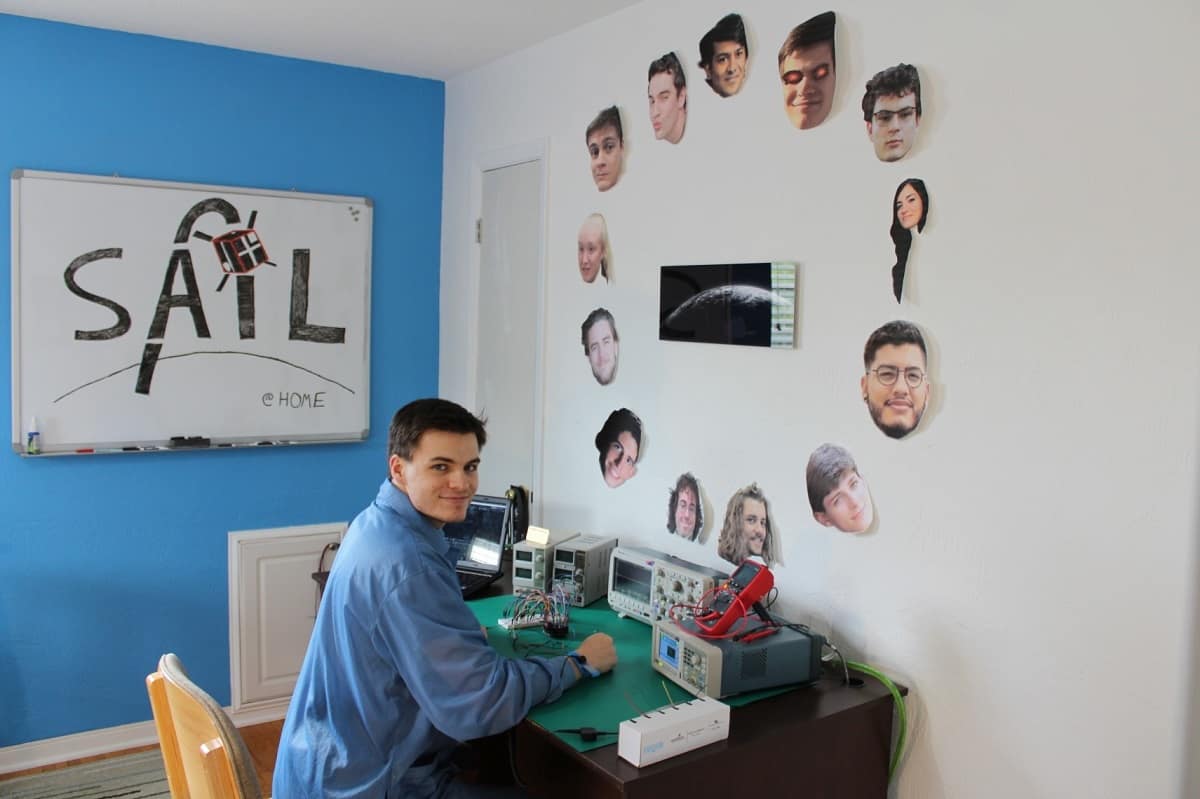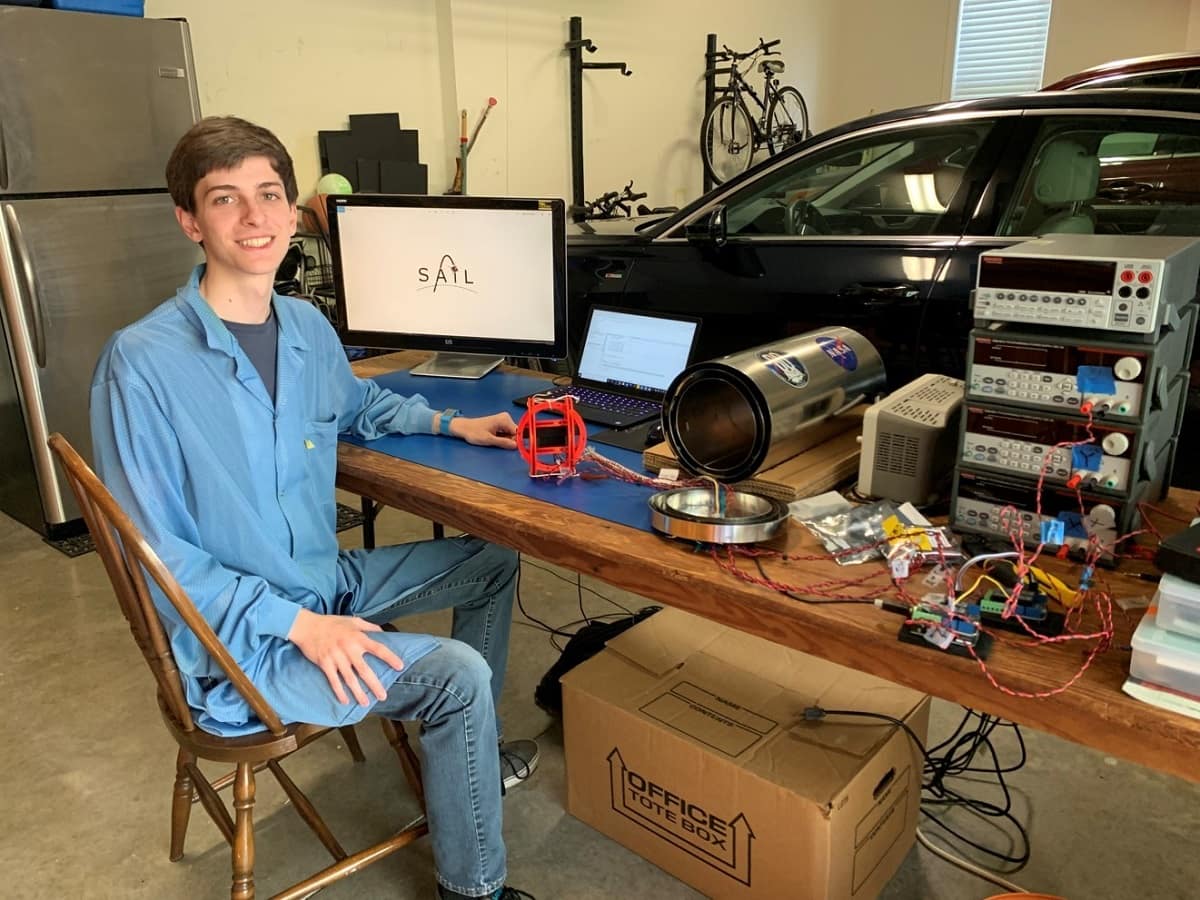Professors Adapt Coursework around Pandemic, Creating Valuable Learning Opportunities for Students

Students in associate professor Patrick Currier’s Manufacturing Processes Lab at Embry-Riddle Aeronautical University are tackling a unique academic challenge this semester that could have an immediate real-world impact.
The challenge: Create a design for an N95 respirator mask, useful for medical staff treating those inflicted with the 2019 novel coronavirus (Covid-19), that can be rapidly manufactured using industrial mass-production methods and available materials.
“The assignment is my attempt to make lemonade out of lemons by having students apply knowledge from the class to relevant problems,” said Currier, adding that the class is generally conducted in a machine shop and usually involves extensive hands-on learning. “Engineers are problem-solvers. If they can’t do the hands-on, they can at least solve a problem that matters.”
Currier’s challenge is just one example of the many ways that Embry-Riddle faculty are adapting to the Covid-19 crisis, and its mandate that residential campus students in Florida and Arizona continue their coursework remotely.
Remote Research for Space Missions
In associate professor Aroh Barjatya’s Space and Atmospheric Instrumentation Lab (SAIL), students are continuing their research — some of it time-critical and NASA-funded — at home.
“I sent the students home with as many lab supplies and peripherals as I could,” said Barjatya. For students working toward critical deadlines — such as on a project to send dual satellites to Mars, a project that must launch on time or face a delay of two years — Barjatya said, “I essentially let them take the whole lab.”
Two of those students, Nathan Graves and Henry Valentine, just won Outstanding Graduating Student Engineering Physics awards from the College of Arts and Sciences’ Physical Sciences Department. The awards were announced April 9.
Barjatya’s students who are not facing strict deadlines are doing critical data analysis and design work, he said. Several students have Remote Desktop Access to the lab computers, so that they can work on more powerful machines than their personal laptops.
“All of them are doing extremely hard work and checking in with me two to three times a week,” Barjatya said.
The SAIL@home set-up of one of the students features the SAIL logo and photos of lab classmates hanging prominently above his desk’s array of lab equipment.
Seeing the set-up “brought absolute joy to me,” Barjatya said. “I want the kids to be safe, I want the kids to keep others safe by having social distancing, and yet I want them to keep making progress without feeling that they are emotionally distant from the rest of the team.”

Embry-Riddle sophomore Josh Milford, who is majoring in Engineering Physics, has set up components from the Space and Atmospheric Instrumentation Lab (SAIL) to work remotely in his garage in Waxhaw, North Carolina. (Photo: Josh Milford)
The Pulmonary System and Ventilators
In Dr. Eduardo Divo’s Biofluid Mechanics course, a lesson he taught just before the crisis — on the physiology and function of the pulmonary system — has drawn more focus during the virtual office hours Divo now conducts with students using Microsoft Teams.
"I think it is easier and more interesting to learn about a subject when you're able to equate it to daily life,” said Tayluer Streat, a senior in Mechanical Engineering, with a concentration in Biomedical Systems. “In Biofluid Mechanics, the focus is on the cardiovascular system, which includes the gas exchange in the pulmonary system. The discussions have been more intense because we are currently living an extreme example."
Also brought into the course content are two projects involving ventilators that Divo has been working on: one, refining an open-source design and prototype for a portable ventilator, and two, a project that involves producing parts to adapt existing ventilators to accommodate more than one patient at a time. Divo has been carrying out that project with Mechanical Engineering Department Machinist Gary Alvey and Ph.D. student Arka Das.
Divo said discussing such projects with his Biofluid Mechanics students has really piqued their interest.
“They like to be very engaged with the current situation and have made interesting suggestions,” Divo said, adding that ventilators are based on a relatively simple technology, with a lot of room for improvement. “I won’t be surprised if some of our students are already thinking of how to make it work better.”
Game On
In Embry-Riddle’s College of Arts and Sciences, associate professor Steven Master and the students in his sports writing class had to redirect dramatically after sport seasons were either postponed or cancelled.
So far they have leaned much more heavily on technology, using the phone, email, Zoom and Podbean to do interviews with coaches and athletes in order to tell the story of how life changes when, suddenly, there are no games to be played.
“These students have been remarkable in their resourcefulness and in their understanding that, while the circumstances have changed, they have some really poignant stories to tell about athletes who saw their seasons end so abruptly,” said Master.
Embry-Riddle Communication major Katy Thompson, a junior, had planned to cover an Embry-Riddle men’s baseball game. Instead, she is writing a recap of the men's basketball team’s outstanding season — which ended suddenly with the cancellation of the NCAA Division II tournament — based on phone interviews with the coach and players.
“The story is shaping up to be an excellent one,” said Master. “I think it’s going to be publishable.”
“We are working on interview skills in a more virtual setting,” said Thompson. “I feel like we are getting good experience out of the whole thing and can still write creative pieces.”
Master added that the class has been reading articles by prominent sports journalists about how the pandemic has given us all a better understanding of the importance of sports in American life.
“We know there are bigger and more important things at play here than sports,” said Master. “But there’s some real loss these students are experiencing, that our culture is experiencing, and to be able to have this conversation with them and hear them articulate their views on the role of sports in our culture achieves one of the learning outcomes of the course in a way none of us could have imagined.”

 Michaela Jarvis
Michaela Jarvis